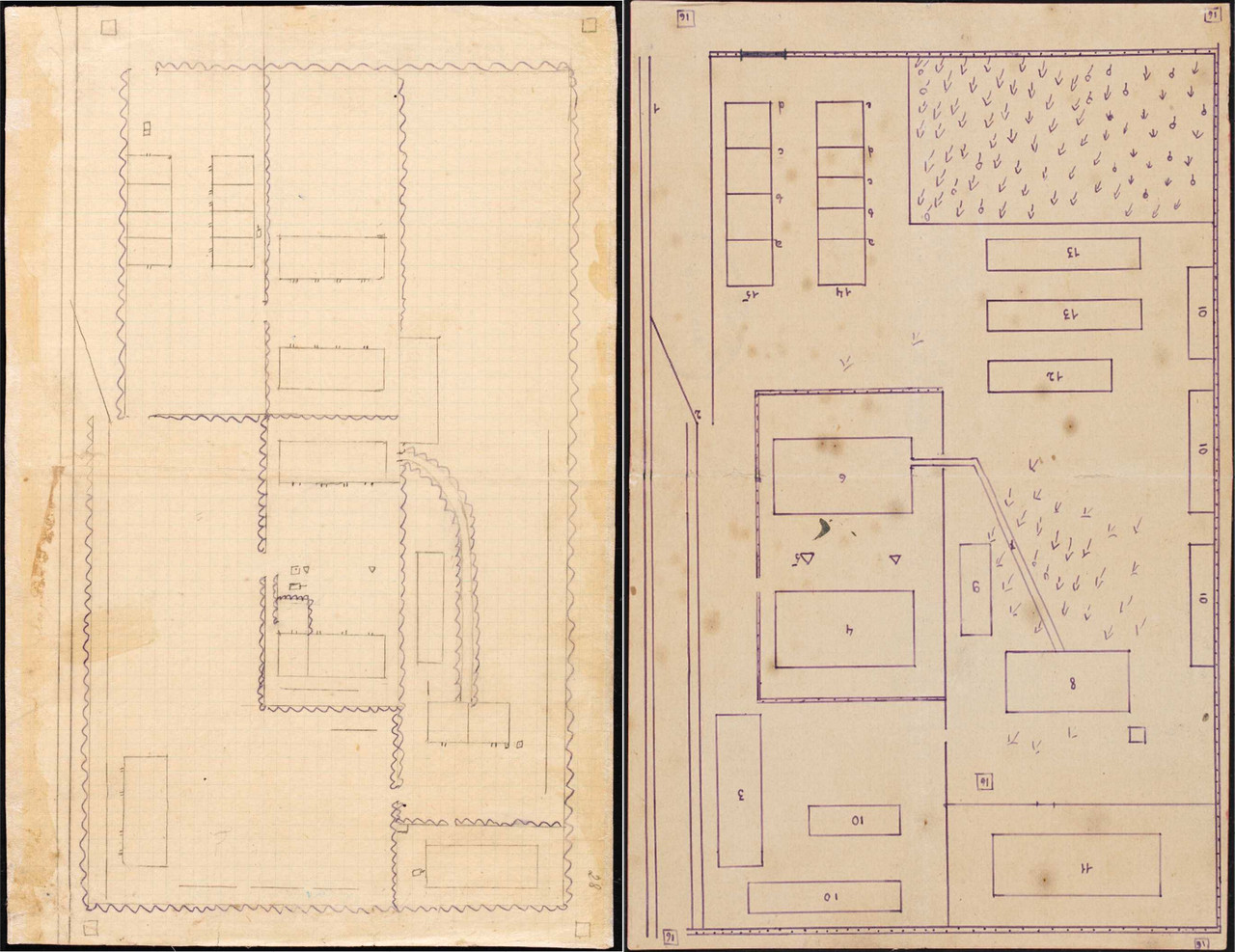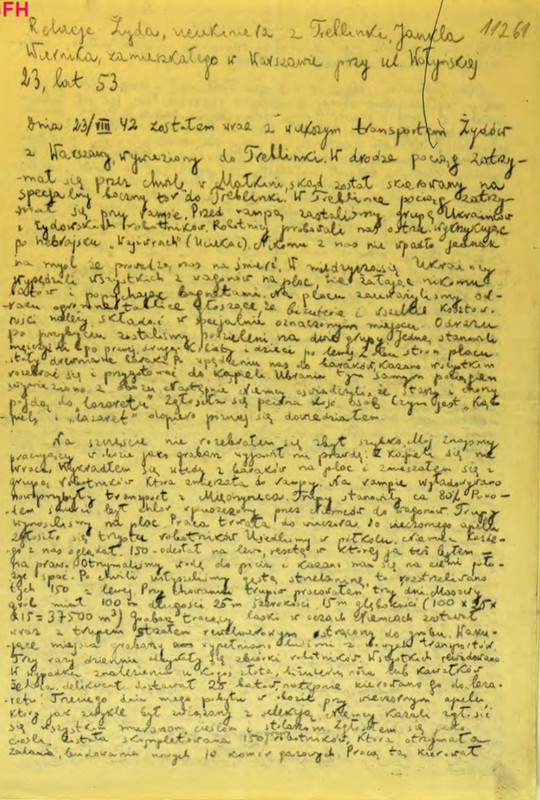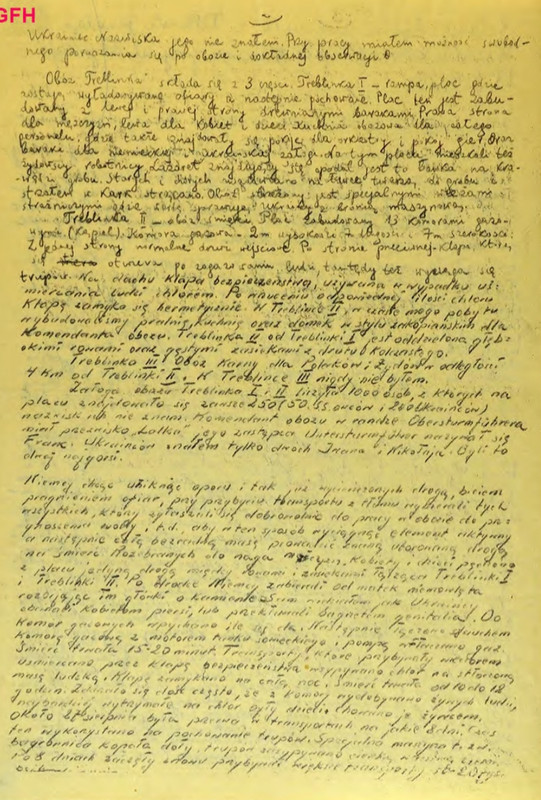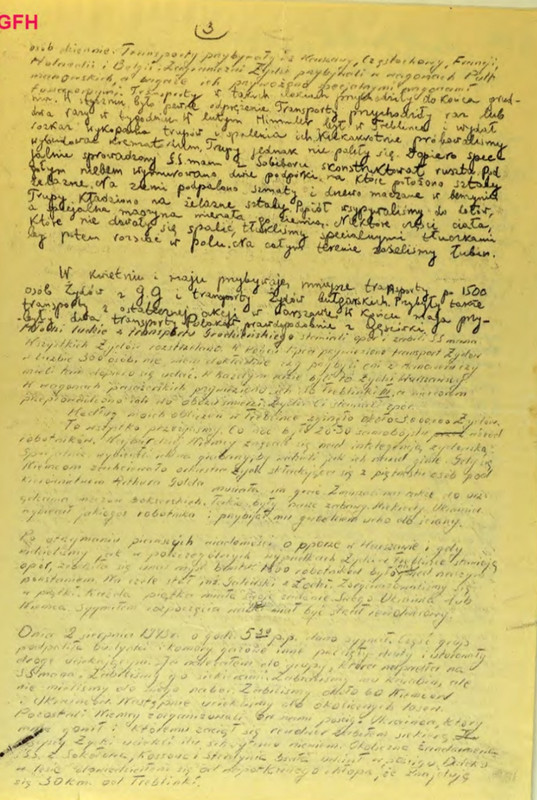Page 12 of 16
Re: Jankiel Wiernik
Posted: Sat Nov 22, 2025 4:21 pm
by pilgrimofdark
Stubble wrote: ↑Sat Nov 22, 2025 3:41 pm

I'm not in the field of 'textual analysis', but, I have to tentatively say 'yes'.
That's entirely too funny, and you can't make this shit up!
Yeah, even if Krzepicki had an entirely different staff of adminstrative assistants than Wiernik, that just raises different problems than if there's significant overlap between the Writing Committees.
I wonder why they're each writing only a couple paragraphs at a time.
Were they literally just passing around the sheets of paper to each other? One person would add the deportation, the next person would write an account of arriving at the camp, the next would add references to chlorine poisoning, etc.
Similar to Wiernik, Krzepicki's manuscript was lengthened before being published. By who?
Donat transforms an 12-page account into 70 pages.
The conventional answer is that Krzepicki/Wiernik broke down crying for so long in between paragraphs that different people had to take "shifts" in writing the accounts down.
Re: Jankiel Wiernik
Posted: Sat Nov 22, 2025 4:42 pm
by Stubble
Does it come to us through Auerbach?
Perhaps the 'writing circle' would brainstorm sessions, take notes, then compile them.
If this comes to us from the 'Warsaw library' in one of the 'metal cases' or 'milk cans', it seems likely that
we were never actually intended to see it, but, since that garbage got preserved and became a new type of 'holy scripture', now we can.
The irony, it is just so super rich and comically golden.
I
can't stop laughing

Re: Jankiel Wiernik
Posted: Sat Nov 22, 2025 4:57 pm
by pilgrimofdark
Stubble wrote: ↑Sat Nov 22, 2025 4:42 pm
Does it come to us through Auerbach?
Perhaps the 'writing circle' would brainstorm sessions, take notes, then compile them.
If this comes to us from the 'Warsaw library' in one of the 'metal cases' or 'milk cans', it seems likely that
we were never actually intended to see it, but, since that garbage got preserved and became a new type of 'holy scripture', now we can.
The irony, it is just so super rich and comically golden.
I
can't stop laughing

Of course! Ringelblum Archive, recovered in 1950.
Donat says this in the intro to Krzepicki's Expanded Edition (not disclosed as inexplicably expanded):
The leaders of the ghetto underground archives (under the historian Emanuel Ringelblum) entrusted Rachel Auerbach with the task of recording the testimony given by Krzepicki (December 1942-January 1942).
"The task of recording." She must have subcontracted it out.
Reminder that Auerbach accompanied the "13 Apostles of Treblinka" on their trip there in 1945 with the Polish investigator and surveyor who didn't know which direction north was (or did he?).
Re: Jankiel Wiernik
Posted: Sat Nov 22, 2025 5:02 pm
by Stubble
The '13 Apostles' of Treblinka and the judge also 'Found no Mass Graves'.



I'm sorry, I simply can not stop laughing, this is just so insanely ridiculous, and has been 'gospel' for nigh on 80 years!
Perhaps we can pinpoint the 'diet committee', who published the 'work' and see if there is overlap in personnel with the 'underground' publishing house that brought us 'A Year in Treblinka'? A favorite of the forest jews of Poland?
Re: Jankiel Wiernik
Posted: Sat Nov 22, 2025 9:37 pm
by pilgrimofdark
These are the two Krzepicki maps side-by-side. From Rachel Auerbach's Yiddish notebook on the left, and the committee-written Polish manuscript on the right.
You can see the evolution of the Campaign Tremblinka III, as dungeon master Auerbach drafts and refines the map that will be used for her newest Dungeons & Dragons RPG game night.
It's also possible these show the evolution of the construction of camp buildings from somewhere based on Polish Home Army surveillance at the time. But it could be a hallucination cooked up solely in Warsaw.
Auerbach notebooks (no map key):
https://cbj.jhi.pl/documents/729025/519/
Polish collaborative manuscript (has a map key):
https://cbj.jhi.pl/documents/727956/0/
Posting here in case anyone wants to compare to the early Wiernik maps, or the handwriting in the Wiernik collaborative writing project.
Re: Jankiel Wiernik
Posted: Sat Nov 22, 2025 10:48 pm
by Stubble
Maps
Handwriting
Taken from;
viewtopic.php?t=525
Also, anybody seen Dean? Hope all is well. If he is working on another documentary that will be a treat. I seriously should buy that fellow a coffee or a beer.
Re: Jankiel Wiernik
Posted: Tue Nov 25, 2025 4:04 pm
by Stubble
Currently going through T-459 looking for any correspondence related to the transport described by Wiernik.
Going through this stuff seriously makes my head feel like my brain has turned in to tapioca after a while. I need to find a better way to winnow this stuff....
Re: Jankiel Wiernik
Posted: Sat Nov 29, 2025 1:13 am
by pilgrimofdark
Similar to the Polish Home Army formation who reported on the Treblinka Revolt at the labor camp, one Ukrainian guard at T-I also says the uprising was at the labor camp.
Interrogation of a guard named "Kozlov":
During my service in Treblinka "work camp" No. 1 from March 1943 until the end of July 1944, in the position of a guard, I took part in the mass extermination of prisoners, beat them and shot them.
...
At the end of July 1943, during a prisoner escape from a camp, I raised the alarm and, along with the Germans, pursued the escapees, shooting them with a rifle. I personally killed one person, and several others were killed by the Germans.
- Special note No. 4/6451 from the head of the SMERSH R&D department of the 65th Army, Colonel NG Trapeznikov, to the Military Council of the 65th Army “On the case of the arrested guards of the Treblinka camp – Kozlov, Shkarupa-Poleshchuk, Sirota, Rekalo, Rozhansky and Shevchenko.” September 17, 1944. Active Army
So even the Treblinka guard inside the labor camp has a tough time differentiating between the two camps.
Anyway, the interrogations of the Ukrainian guards was done very shortly after the 1944 Soviet investigation and seems to add nothing revelatory. Just echoes the Wiernik book they'd already translated over a month earlier.
Glad I spent all afternoon extracting the Russian text of these
FSB documents, fixing the transcription, and AI-translating it to confirm there's nothing new in it, other than that everyone is confused about the difference between T-I and T-II.
...or are they?
Re: Jankiel Wiernik
Posted: Sat Nov 29, 2025 4:05 pm
by Stubble
I wonder if there is a way to check personnel records for T1 to see if this guy just told them what they wanted to hear to make the hurting stop...
Re: Jankiel Wiernik
Posted: Sun Nov 30, 2025 12:49 am
by pilgrimofdark
Stubble wrote: ↑Sat Nov 29, 2025 4:05 pm
...this guy just told them what they wanted to hear to make the hurting stop...
I think this explains much of the 1944 Soviet investigation. And some interested Soviet-Jewish-Polish partisans that just wanted the Germans dead and gone.
"Tell us what happened at the Treblinka death camp."
> Well, I was sorting pens and packing them into suitcases.
*NKVD raises gun*
> Oh, and entire trainloads of people were killed with poison gas bullets!
*NKVD lowers gun*
> Then I used the barrels of chlorinated lime to bleach my own clothing.
*NKVD raises gun*
> And that's how they killed 3.5 million Jews!
*NKVD lowers gun*
> I saw the French diesel engine that ran the electricity.
*NKVD raises gun*
> And it was used to kill people! I know that for sure!
*NKVD lowers gun*
Anyway, to justify this stupid joke, here's something actually relevent to Wiernik, kind of.
The Center for Jewish History has a copy of the
first English edition of
One Year in Treblinka.
Interesting enough, but it is followed by a long handwritten document in English, which seems to be the work-in-progress translation.
It includes the sequence about Wiernik going to Malkinia, then leaving Malkinia for Treblinka station, then seeing the trainload of half-naked Jews passing him. The part about going to Treblinka station first was left out of the published version, as well as every other English edition I can find.
Re: Jankiel Wiernik
Posted: Sun Nov 30, 2025 1:07 am
by Stubble
The 'Warsaw Circle' will certainly get some of my time going forward.
I might even go so far as to dig for correspondence between Poland and the guy that wrote the volumes of 'Polish jewry' in Argentina. He had been the head of 'The Polish AntiHitler Committee' after all, so, surely there is a 'there there'. Overlap and correspondence, I'm guessing here, would likely have been through Berman Adolf - Avraham to Mark in Argentina.
Soviet correspondence will likely be harder to establish.
I find irony in that these people, who should have been at the top of the target list for the operations of the Einsatzgruppen skated. Not only skated, but, set up shop like termites and just pumped out atrocity propaganda.
It merits further study...
--------------------------------
Mark Turkov the man who published 'Polish jewry';
https://congressforjewishculture.org/pe ... rek-turkow
--------------------------------
Some of Adolf Berman's papers and things;
https://portal.ehri-project.eu/units/il ... erman_coll
Also a friendly reminder, Wiernik was operating a cell under this man, and submitting to him his paybooks for monetary remuneration. Oh, and he was a fellow Zionist/Communist.
Re: Jankiel Wiernik
Posted: Sun Nov 30, 2025 1:52 am
by pilgrimofdark
The Ringelblum group could definitely use a research topic, despite how broad it could be. Everything seems to flow into and out of this group in some aspect.
Mark Turkov / Marek Turkow comes from an important family.
Turkow Family in the Encyclopedia of Jews in Eastern Europe.
Mark doesn't get a mention in the book
The Warsaw Ghetto: A Guide to the Perished City, so you can save your $150. Don't let ChatGPT lie to you about what's in that book like it did to me
Some of the other family members get a mention, though. I'll check if there's anything interesting. Mark had left Poland by 1939 anyway.
A Jonas Turkow shows up in a document of "Surveillance and search for individuals suspected of political activity. Protocols, lists, correspondence." [Inwigilacja i poszukiwanie osób podejrzanych o działalność polityczną. Protokoły, wykazy, korespondencja.]
-
Archiwum Akt Nowych 2/1558/0/-/3
A better photo of Mark/Marek is here:
Narodowe Archiwum Cyfrowe 3/1/0/11/993.
Some stuff on the Ghetto Fighters House, too. Even a whole collection of documents from Jonas Turkow.
Re: Jankiel Wiernik
Posted: Sun Nov 30, 2025 2:09 am
by Stubble
Even as broad as a topic on the milk can hiding brigade could get, I was thinking about a thread for Polish propaganda in general that would include the Warsaw Circus.
The tie ins to the Soviet are not as hard as I thought they were going to be, as I keep forgetting Berman was a communist. Many Zionists were (looking at you Mark from 'Argentina'). It's almost like the nazis recognized the subversive threat these prominent intellectuals posed as they promoted Soviet ideology and pumped it into the soft heads of an entire generation.
We are gradually stepping out of Wiernik territory though. So, a new thread is in order.
Let me know if I can take some of the sting out of buying that book man, I'd certainly try to help, I just don't know how to shove money through the screen.
To be very clear, Mark fled to Argentina before Germany invaded. He was not in Warsaw. If I recall correctly he was involved with The World jewish Congress though, and so there ostensibly should have been some overlap in communication, and he also likely kept up with old friends (fellow travelers). Oh, and he was vice-president of the World Union of Polish Jewry, I almost forgot to mention that...
Ideas for thread titles;
-Polish Atrocity Pulp Mills During the Occupation-
-The Warsaw Circus-
I don't have enough for a thread, and Pilgrimofdark, you keep running past me before I even get lined up on the block man, damn you are fast.
Re: Jankiel Wiernik
Posted: Mon Dec 01, 2025 2:51 pm
by pilgrimofdark
Stubble wrote: ↑Sun Nov 30, 2025 2:09 am
We are gradually stepping out of Wiernik territory though. So, a new thread is in order.
I might compare the Polish/AI-translated version of
A Year in Treblinka to the original English and the Donat translation. Lots of shenanigans.
Either Donat was the translator of the first English edition, or he plagiarized large parts of it: the translations of entire sentences/paragraphs are identical or very slightly altered in wording but the sentence structure remains the same. And that sentence structure differs markedly from the original Polish. So maybe Donat was polishing up and rewording the first English translation. He also added in some passages that are omitted from the first English, but those might be in the handwritten version.
Anyway, a character named "Frankenstein" appears in the book. He's at Treblinka beating up on Wiernik and others.
A German referred to as "Frankenstein" was also present in the Warsaw Ghetto.
Another specific type of patient were victims—who usually died—who had been shot by the terror of the ghetto, a gendarme known as "Frankenstein."
The German gendarme known as Frankenstein ... was notorious for cruelty to children; he mercilessly killed little smugglers.
This meant that there were more wounded because "Frankenstein" was standing at the Wache [guardhouse]. He was a soldier who amused himself by shooting at children as if they were sparrows.
-
The Warsaw Ghetto: A Guide to the Perished City. pp. 246,447, 458.
In
A Year in Treblinka, Frankenstein only gets a single mention and then he is written out of the script.
Re: Jankiel Wiernik
Posted: Tue Dec 02, 2025 1:41 am
by pilgrimofdark
Wetzelrad wrote: ↑Sat Sep 20, 2025 8:00 pm
The first footnote is also important.
1 AAN, 1325/202/II-29, p. 72. This document was translated from Polish. Reprinted in: Kraj, No. 9/10, September 28, 1943, pp. 30–31. Świadkowie zbrodni. Kraj. Agencja Informacyjna (The Country. News Agency) was the press service of the Government Delegation, which appeared once or twice a week from July 1943 onwards with a circulation of 750 copies under the editorship of Kirył Sosnowski (1910–1966).
...
Also
Verfolgung und Ermordung quotes its version from a standalone source with numerous handwritten corrections, which tells us this was another draft. If we had a scan of that we could compare the typewriting and handwriting with other documents.
I overlooked this before since Wetzelrad found the
Kraj version.
The AAN version is listed online, but not digitized.
"Reports on the situation of Jews in ghettos and camps outside Warsaw." [Meldunki o sytuacji Żydów w gettach i obozach poza Warszawą.]
Archiwum Akt Nowych (AAN) 2/1325/0/2/202/II/29
I don't know how important it is. It's 82 pages, so the full document scan might cost around $23 from the archive. Getting a copy of the single page is around 28 US cents.



